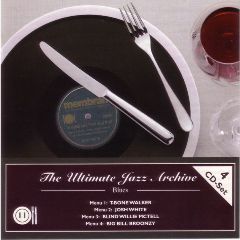The Ultimate Jazz Archive Vol.41 - T-Bone Walker [1929-1946] [2005]
The Ultimate Jazz Archive Vol.41 - T-Bone Walker [1929-1946] [2005]

01.Trinity River Blues 02.Wichita Falls Blues 03.T-Bone Blues 04.I Got A Break Baby 05.Mean Old World 06.Low Down Dirty Shame (Married Woman Blues) 07.Sail On Boogie 08.I’m Still In Love With You 09.You Don’t Love Me Blues 10.T-Bone Boogie 11.Mean Old World Blues 12.Evening 13.My Baby Left Me (Blues) 14.Come Back To Me Baby (Blues) 15.She’s Going To Ruin Me (Blues) 16.I Can’t Stand Being Away From You 17.No Worry Blues 18.Don’t Leave Me Baby 19.Bobby Sox Blues 20.I’m Gonna Find My Baby
Aaron Thibeaux Walker aka T-Bone Walker (guitar, vocals; May 28, 1910 – March 16, 1975)
It was T-Bone Walker, B.B. King once said, who “really started me to want to play the blues. I can still hear T-Bone in my mind today, from that first record I heard, ‘Stormy Monday.’ He was the first electric guitar player I heard on record. He made me so that I knew I just had to go out and get an electric guitar.”
T-Bone Walker was born Aaron Thibeaux Walker to musical parents on May 28, 1910, in Linden, Texas. When he was two, his family moved to Dallas. Through his church choir and his street-singing stepfather, Marco Washington, he became interested in music. He got his nickname T-Bone at an early age. His mother called him T-Bow – a shortening of his middle name Thibeaux – which evolved into T-Bone, the moniker he'd use throughout his career. By the time he was 10, Walker was accompanying his stepfather at drive-in soft drink stands. Around the same time, he became the “lead boy” for Blind Lemon Jefferson, who was the most popular and influential country bluesman of the Twenties. From 1920 to 1923, Walker would lead Jefferson down Texas streets.
While still in his teens, Walker, who was self-taught on guitar, banjo and ukulele, toured with a medicine show and with blues singer Ida Cox. In 1929, he began recording acoustic country blues under the name Oak Cliff T-Bone. In 1934, Walker moved to Los Angeles, where he soon began playing amplified guitar – a claim he made later in life. If that is true, he was one of the first major guitarists to go electric. And, indeed, he pioneered the electric guitar sound that helped create the blues and thus influence all popular music that followed.
In 1939, Walker joined Les Hite’s Cotton Club Orchestra. It was a rough-and-tumble big band whose alumni included Dizzy Gillespie and Lionel Hampton. With the Hite band, Walker perfected his flowing, hornlike guitar licks and his mellow blues vocals. Over the next decade, he worked with both small groups and big bands, on the West Coast and on tours through the Midwest and all the way to New York.
He first recorded as T-Bone Walker in 1942, and the following year he had his biggest hit, “Call It Stormy Monday,” which as “Stormy Monday Blues” or just “Stormy Monday” has become one of the most frequently covered blues songs. Walker recorded for Black & White Records, the label that released “Stormy Monday,” until 1947. He recorded other classics for the label, including “T-Bone Shuffle” and “West Side Lady.”
In 1950, Walker signed with Imperial Records, where he remained until 1954. At Imperial, he cut “The Hustle Is On,” “Cold Cold Feeling,” “Blue Moon,” “Vida Lee” and “Party Girl.” He then moved on to Atlantic Records. He recorded sessions in 1955, 1956 and 1959, and they were finally released in 1960 on the album T-Bone Blues.
Walker’s career began to slow down during the Sixties. He made an appearance at the American Folk Blues Festival in 1962, performing with Memphis Slim and Willie Dixon, among others. In 1968, he released the album I Want a Little Girl. And, in 1971, he won the Grammy Award for Best Ethnic or Traditional Folk Recording for the album Good Feelin’.
In 1973, Walker climaxed his recording career with the double album Very Rare. It was produced by Jerry Leiber and Mike Stoller, and they assembled an all-star cast of jazz veterans and young studio pros to honor the great bluesman.
The following year, Walker became inactive after he was hospitalized with bronchial pneumonia. He died from the disease on March 16, 1975.
T-Bone Walker’s single-string solos influenced blues players like B.B. King and such rockers as Eric Clapton and Stevie Ray Vaughan. As Pete Welding wrote: “T-Bone Walker is the fundamental source of the modern urban style of playing and singing the blues. The blues was different before he came onto the scene, and it hasn’t been the same since.” --- rockhall.com
download:
uploaded yandex 4shared divshare mediafire mega solidfiles zalivalka cloudmailru filecloudio anonfiles oboom
Zmieniony (Sobota, 13 Wrzesień 2014 17:33)








